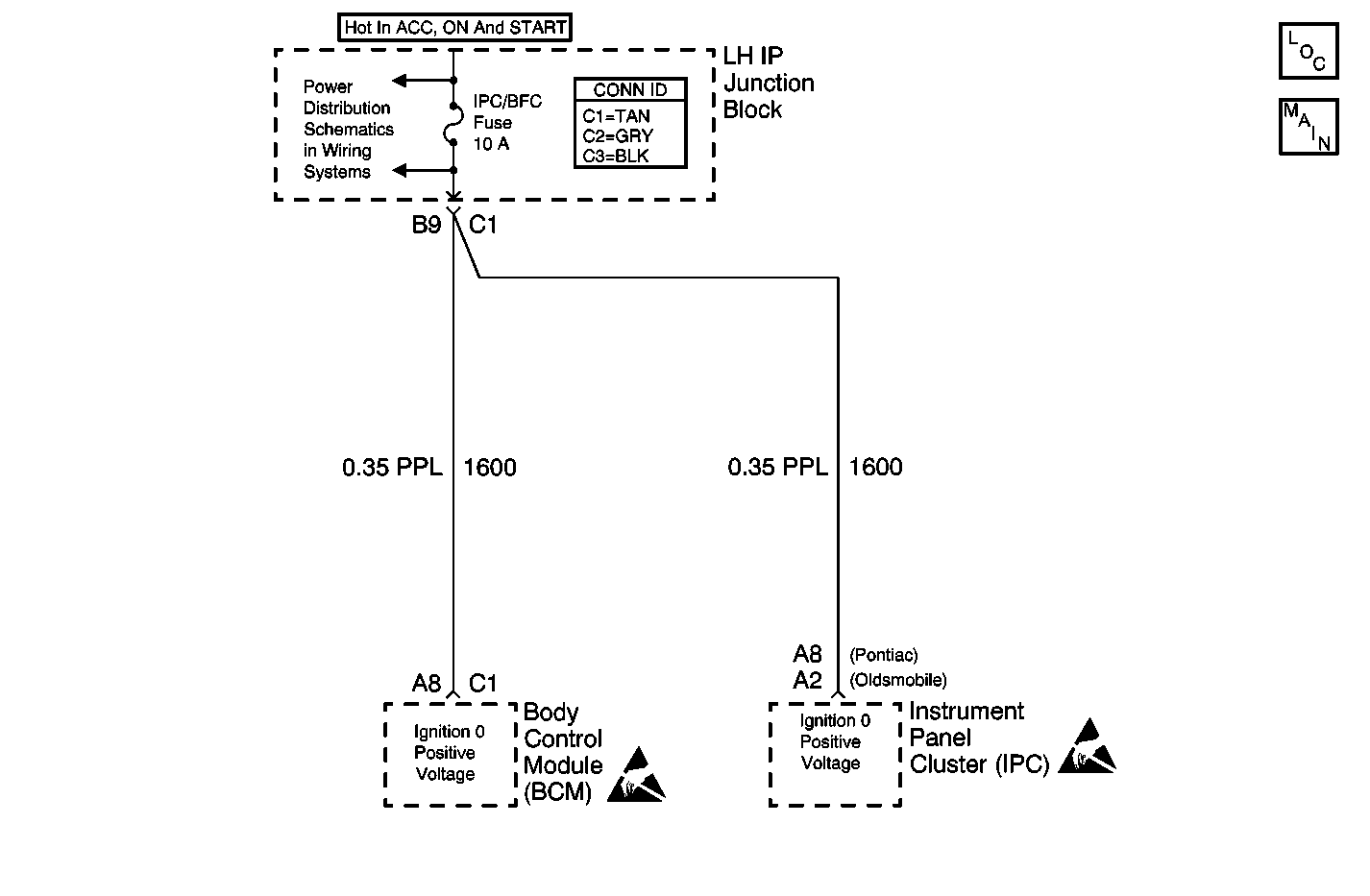
Circuit Description
Circuit 1600 is the ignition 0 input to the body control module (BCM) and the instrument panel cluster (IPC). This input can be either in the on or off position from the ignition switch. If the BCM senses that the ignition 0 input is inactive, DTC B1369 is set.
Conditions for Running the DTC
| • | The ignition switch is on. |
| • | At least 20 seconds has elapsed since the ignition switch was cycled on. |
Conditions for Setting the DTC
The ignition 0 input is inactive after the ignition 1 input has been active for 20 seconds.
Action Taken When the DTC Sets
| • | Multiple indicators illuminate on the IPC. |
| • | The vehicle will not start. |
Conditions for Clearing the DTC
| • | A current DTC B1369 will clear when the malfunction is no longer present and the ignition switch is cycled. |
| • | All BCM history codes will be cleared after 100 ignition cycles (from OFF to ON) with no current codes active during the 100 ignition cycles. |
Diagnostic Aids
If the DTC is a history DTC, the problem may be intermittent. Perform the tests shown while wiggling the wiring and connectors. This can often cause the malfunction to appear.
Test Description
The numbers listed below refer to the numbers on the diagnostic table.
-
This step determines if CKT 1600 is shorted to ground.
-
This step determines if the body control module (BCM) is internally shorted.
-
This step determines if the instrument cluster is internally shorted.
-
This step determines if voltage is supplied from the battery to the fuse.
Step | Action | Yes | No |
|---|---|---|---|
1 | Did you perform the Body Control Module Diagnostic System Check? | Go to Step 2 | |
2 |
Does the scan tool display ACTIVE? | Go to Testing for Intermittent Conditions and Poor Connections in Wiring Systems | Go to Step 3 |
3 | Inspect the IPC/BFC ACC fuse in the left IP junction block. Is the fuse open? | Go to Step 4 | Go to Step 7 |
Does the test lamp illuminate? | Go to Step 5 | Go to Testing for Intermittent Conditions and Poor Connections in Wiring Systems | |
Does the test lamp still illuminate? | Go to Step 6 | Go to Step 11 | |
Does the test lamp still illuminate? | Go to Step 9 | Go to Step 12 | |
Does the test lamp illuminate for one of the circuits? | Go to Step 8 | Go to Step 10 | |
8 | Test the ignition 0 positive voltage circuit for an open. Refer to Circuit Testing and Wiring Repairs in Wiring Systems. Did you find and correct the condition? | Go to Step 15 | Go to Step 13 |
9 | Repair the short to ground in the ignition 0 positive voltage circuit. Refer to Wiring Repairs in Wiring Systems. Did you complete the action? | Go to Step 15 | -- |
10 | Repair the open in the ignition feed circuit to the IPC/BFC ACC fuse. circuit. Refer to Wiring Repairs in Wiring Systems. Did you complete the action? | Go to Step 15 | -- |
11 | Inspect for poor connections at the harness connector of the BCM. Refer to Testing for Intermittent Conditions and Poor Connections and Connector Repairs in Wiring Systems. Did you find and correct the condition? | Go to Step 15 | Go to Step 13 |
12 | Inspect for poor connections at the harness connector of the IPC. Refer to Testing for Intermittent Conditions and Poor Connections and Connector Repairs in Wiring Systems. Did you find and correct the condition? | Go to Step 15 | Go to Step 14 |
13 | Replace the BCM. Refer to Body Control Module Replacement . Important: Perform the setup procedure for the body control module. Refer to Body Control Module (BCM) Programming/RPO Configuration . Did you complete the replacement? | Go to Step 15 | -- |
14 | Replace the IPC. Refer to Instrument Cluster Replacement in Instrument Panel, Gauges and Console. Did you complete the replacement? | Go to Step 15 | -- |
15 |
Does the DTC reset? | Go to Step 2 | System OK |
